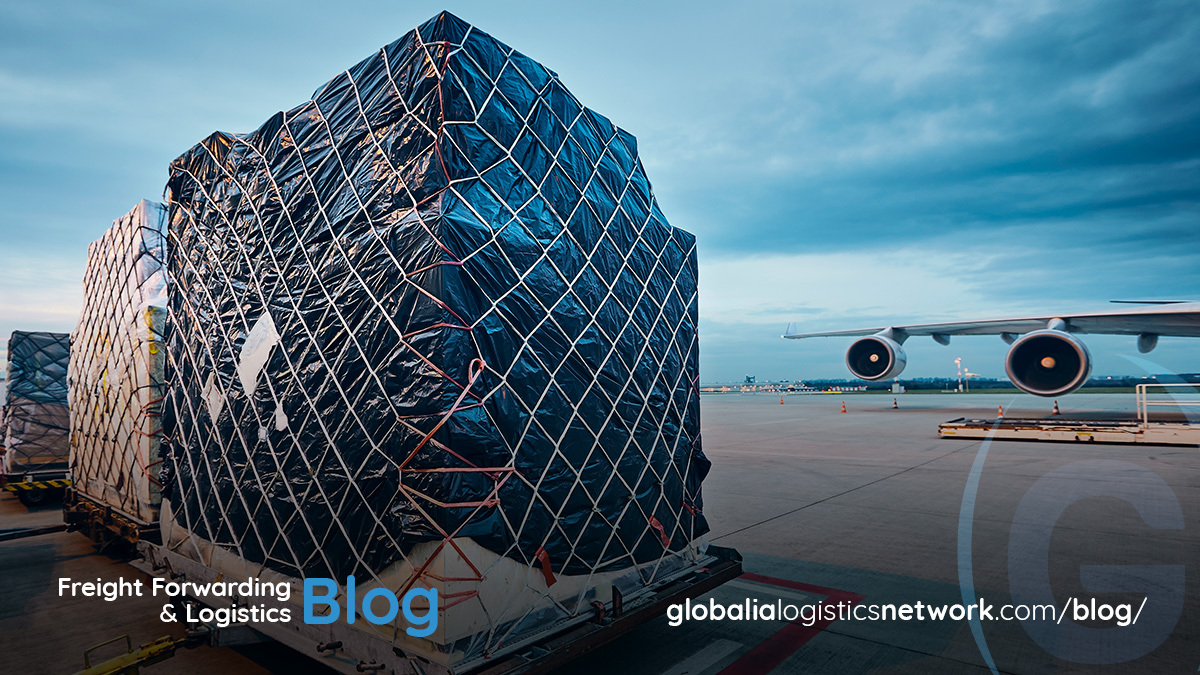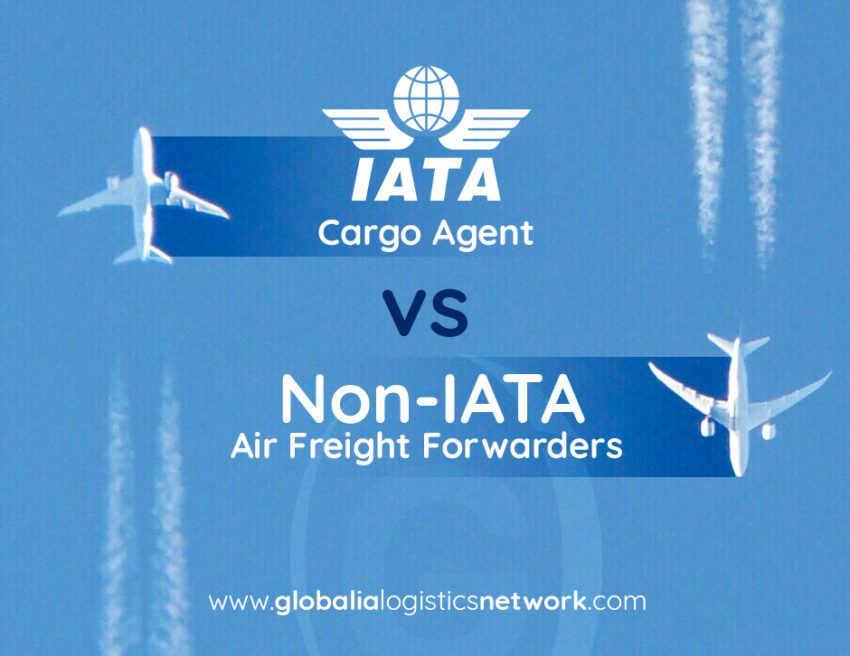The world of air freight forwarders is complex and highly regulated, requiring expertise, strategic partnerships, and industry accreditations to remain competitive. One of the most debated topics among freight forwarders is whether to operate as an IATA Cargo Agent or as a Non-IATA air freight forwarder. While both play a crucial role in air cargo transportation, the distinctions between them impact operations, costs, and global reach. In this article, we break down the key differences and explore why forwarders without IATA accreditation can still thrive by leveraging strategic partnerships, such as those within an international freight forwarders network like Globalia Logistics Network.

What is an IATA Cargo Agent?
An IATA Cargo Agent is a freight forwarder accredited by the International Air Transport Association (IATA). This accreditation grants them the ability to work directly with airlines, issue air waybills (AWBs), and negotiate freight rates without intermediaries. Essentially, IATA accreditation signifies reliability and compliance with international air cargo standards.
Key Benefits of Being an IATA Cargo Agent:
- Direct Access to Airlines: IATA agents can book cargo space directly with airlines, eliminating reliance on third parties.
- Competitive Freight Rates: Due to direct airline relationships, IATA agents often secure better pricing for shipments.
- AWB Issuance: They can issue their own AWBs, reducing processing time and increasing efficiency.
- Credibility and Trust: IATA accreditation boosts a company’s reputation in the industry.
- Global Recognition: Being IATA-certified assures clients and partners of compliance with international shipping standards.
Despite these advantages, obtaining IATA accreditation requires meeting stringent financial, operational, and compliance requirements. Smaller forwarders may find the process costly and time-consuming.
What is a Non-IATA Air Freight Forwarder?
A Non-IATA Forwarder is an air freight forwarder that operates without IATA accreditation. Instead of dealing directly with airlines, they rely on IATA Cargo Agents or consolidators to book cargo space and issue AWBs.
Key Benefits of Being a Non-IATA Forwarder:
- Lower Operational Costs: No need to meet IATA’s strict financial and operational requirements.
- More Flexibility: Non-IATA forwarders are not bound by airline-imposed volume commitments.
- Collaborative Approach: They often work with multiple IATA agents or freight networks to secure competitive rates.
- Focus on Niche Markets: Many specialize in specific cargo types (e.g., pharmaceuticals, perishables, dangerous goods) without the overhead of an IATA membership.
- Global Reach via Networks: Instead of investing in IATA accreditation, many non-IATA forwarders partner with international freight networks to access exclusive contracts and business opportunities.
While non-IATA Forwarders have their advantages, they face certain limitations, such as reliance on third parties for airline bookings and possible higher costs due to intermediaries.
Which Model is Right for Your Freight Forwarding Business?
Both IATA Cargo Agents and Non-IATA Forwarders play essential roles in the air cargo supply chain. The choice between the two largely depends on your company’s resources, strategy, and market positioning.
- If your company has high air freight volumes, the financial capacity to meet IATA requirements, and wants direct airline relationships, becoming an IATA Cargo Agent might be the right choice.
- If your company operates as a small or mid-sized air freight forwarder, prioritizing flexibility, cost-efficiency, and niche specialization, remaining a non-IATA Forwarder while leveraging partnerships with IATA agents can be more practical.
How Non-IATA Air Freight Forwarders Can Stay Competitive
Not having IATA accreditation doesn’t mean the air freight forwarder is at a disadvantage. In fact, many successful air freight forwarders operate without direct airline access. The key to success lies in forming strategic partnerships and leveraging networks like Globalia Logistics Network.
Why Joining Globalia Benefits Non-IATA Forwarders:
- Globalia Logistics Network equips its members with the tools for success: a powerful global brand, a trusted directory of financially stable partners, and the collective strength to compete for major tenders and secure better rates from carriers and insurers.
- Exclusivity: Globalia accepts only one freight forwarder in each of the world’s 472 main ports and airports, on an exclusive basis. Each GLB member operates as a “virtual branch office” of the network.
- Get New Projects: As a member of Globalia Logistics Network, air freight forwarders get the opportunity to collaborate with trusted partners across 193+ cities worldwide. This expansive network opens doors to valuable sales leads, shared expertise, and joint business opportunities—helping you grow your reach, secure new clients, and compete on a global scale.
- Reliable IATA Partnerships: Many of Globalia’s members across several countries are IATA agents. Non-IATA forwarders can collaborate with trusted IATA agents within the network to book air cargo efficiently.
- Free Digital Tools: Globalia is the first logistics network to make available an online digital freight rate management platform FreightViewer, exclusive and free for members. It offers a digital infrastructure that helps you generate quotes within seconds.
- Marketing and Brand Visibility: Being part of a global network enhances credibility and generates new business opportunities.
- Financial Protection: All members are carefully selected for their financial strength, creditworthiness and reputation. Moreover, they are bound by strict rules and comprehensive protection against late payment and special coverage against non-payment due to bankruptcy or closure. Furthermore, Globalia’s Payment Protection Plan (PPP) safeguards members from financial risks in international transactions.
By joining Globalia Logistics Network, non-IATA forwarders can enhance their global reach, gain credibility, and access exclusive freight rates without the complexities of IATA accreditation.
Not a member yet? Join us today!
Conclusion: Making the Right Choice for Your Business
Whether you operate as an IATA Cargo Agent or a Non-IATA Forwarder, both models have advantages. IATA accreditation offers direct airline relationships and better rates, while non-IATA forwarders enjoy flexibility, lower costs, and strategic collaborations.
For non-IATA forwarders looking to remain competitive, joining a global freight forwarders network like Globalia Logistics Network is a game-changer. By leveraging partnerships with IATA-accredited members, non-IATA forwarders can secure better freight deals, expand their global reach, and enhance business opportunities without the burden of accreditation requirements.
If you’re a non-IATA forwarder looking for global opportunities and stronger industry partnerships, it might be time to consider joining Globalia Logistics Network. Connect with like-minded professionals, access exclusive contracts, and take your air freight operations to the next level!


